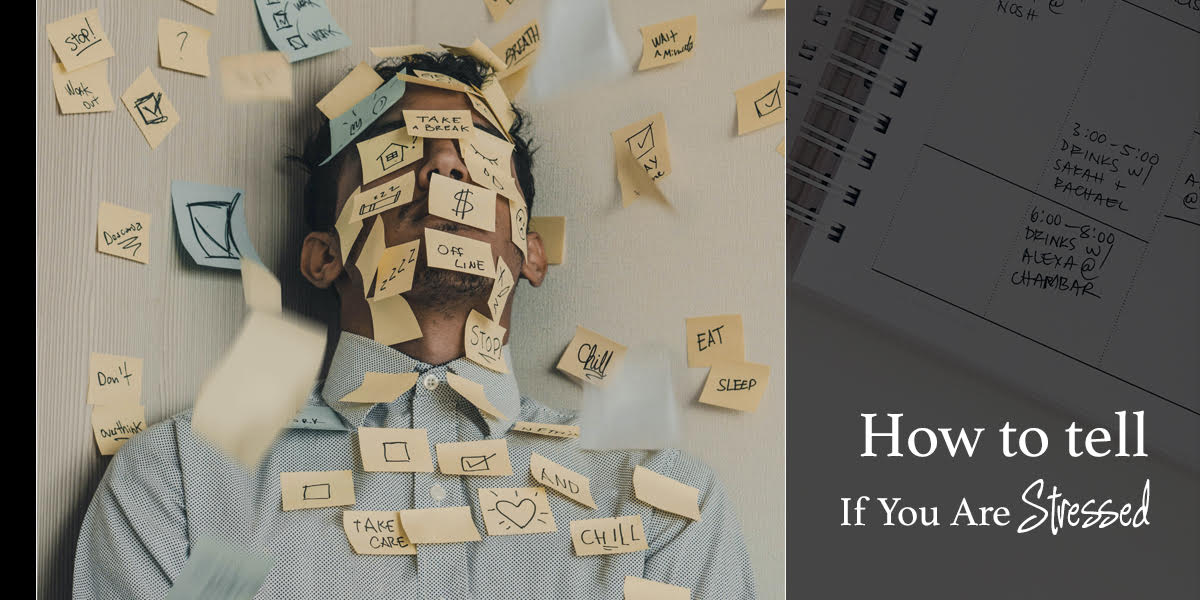How Can You Tell If You Are Stressed (And What To Do About It)

Stress is something of a buzzword these days.
We hear it banded around in different contexts every day. But what does it really mean to be stressed, and more importantly, how can we tell if we are stressed?
Here we delve into how you might be feeling mentally and physically if under stress, as well as some easy strategies to help you to regain control of the beast that is chronic stress.
How Do I Know If I Am Stressed?
Good question. Firstly, let’s focus on how it feels to be chronically stressed, after all, it is this type of ongoing, pervasive stress which has the biggest negative impact on our overall health and wellbeing.
Chronic stress can show up in a number of ways. You may feel:
- Edgy, and uneasy most of the time
- Exhausted- even after sleep
- Unable to concentrate on one task at a time
- Feeling physically tense, for example in the shoulders or neck
- Feeling tearful, or overly emotional
- Not feeling able to enjoy the parts of your life you used to
- Frequent infections, or feeling ‘run down’.
As you can see, this is quite a comprehensive list and indicates the scope of the problem. If chronic stress goes unmanaged for a longer period of time you may also start to suffer more severe and hard to ignore signals.
These can include ongoing insomnia, frequent digestive distress, heart palpitations, or even sudden feelings of overwhelming panic.
You are likely to be feeling stressed if you:
- Have an overly busy schedule – if you have no downtime and run from task to task all day long, then being constantly ‘on’ can increase your levels of circulating stress hormones such as cortisol.
- Don’t sleep well – whilst it is normal and natural to have the odd night of poor sleep when it becomes the norm, it sets us up in a vicious circle of stress – bad sleep – more stress, as good, restorative sleep is key for our stress resilience.
- You don’t make time to work out or eat well. Of course, both of these healthy habits can take time out of your busy life, but actually, if we don’t do these regularly, we can increase our physical and mental stress.
So what can we do to reduce stress?
Luckily, it is not all doom and gloom. There is so much we can do to positively improve our stress status. Once we notice the key signs and signals that stress is mounting we can stop stress in its tracks and prevent things from getting worse.
Ideally, we would also create an anti-stress approach to living which would aim to prevent us from experiencing high levels of stress in the first place.
- Eat well – by eating a nutrient-dense diet, packed full of microbiome boosting fibre, inflammation managing Vitamin D, and plenty of protective omega 3’s, we can increase our physical resilience to the effects of stress. We may also consider adding in stress-supportive supplements such as Magnesium and B vitamins, as well as going easy on the coffee.
- Move More – but not too much; when we are under stress we don’t want to add to our adrenaline levels by competing in very vigorous competitive exercise (unless that is your bag!) ideally, we just want regular and consistent movement including cardio, resistance work and more meditative forms such as yoga.
- Find the time for fun – we can become very serious in our hectic, goal-focused lives. Instead, we can switch our nervous systems into the rest and digest state by including regular periods of ‘play’ where the sole purpose of the activity is enjoyment.
- Do absolutely nothing – short periods of rest can actually make us more productive than just powering through. Techniques such as progressive muscle relaxation and yoga Nidra can reset body and mind, helping you to make up for lost sleep, and giving your nervous system a much-needed break.
- Tame the Tech – if we can pull pack on our tech addiction, we can free up some much-needed mental space. The constant barrage of notifications can stimulate our stress response many times a day. Instead, aim to have screen-free periods morning and night or at least switch off notifications.
Key Takeaways
- Stress, when chronic can cause havoc for our bodies and minds – signals we are suffering includes anxiety, tension, and poor sleep
- We can do many things to reduce the effect of ongoing stress on our health, including eating well and finding the time for both rest and play.
Image credit: Luis Villasmil on Unsplash







Pingback: Effective Exercises for Crohn's Disease: Improve Your Well-Being - Healthy Smart Living
August 18, 2023 at 8:14 pmPingback: Benefits of Rosemary Oil and Medicinal Usage - Healthy Smart Living
February 19, 2024 at 1:47 pm